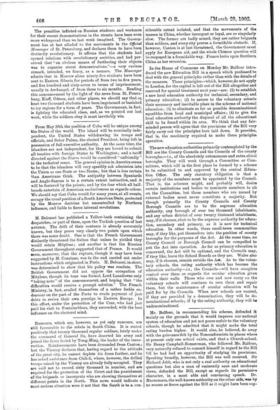The new education authorities primarily contemplated by the Bill are
the County Councils and the Councils of the county boroughs,—i.e., of the absolutely autonomous and extra-shiral boroughs. They will work through a Committee or Cora- mittees, which will in the first place be formed by a scheme to be submitted to and approved by the central Educa- tion Office. The only statutory obligation is that a majority of the members must be appointed by the Council. That is, the schemes might, and probably will, desire certain institutions and bodies to nominate members to sit on the Committee, but those members who are named by external bodies must never constitute a majority. But though primarily the County Councils and County Borough Councils are to be the supreme education authority, any borough of over ten thousand inhabitants, and any urban district of over twenty thousand inhabitants, may, if it chooses, elect to be the supreme authority for educa- tion, secondary and primary, as it is now for technical education. In other words, these small-town communities may, if they like, put themselves into the position of county boroughs for the purposes of the Act. At the same time, no County Council or Borough Council can be compelled to put the Act into operation. As far as primary education is concerned, the Act will be optional, and the Councils may, if they like, leave the School Boards as they are. Wales also may, if it chooses, remain outside the Atilt. As to the volun- tary schools, the rating authority which has become the education authority—i.e., the Councils—will have complete control over them as regards the secular education given within their walls. Those who own and now carry on the voluntary schools will continue to own them and repair them, but the maintenance of secular education will be paid for by the Councils. When new schools are wanted, if they are provided by a denomination, they will be de- nominational schools; if by the rating authority, they will be undenominational.






































 Previous page
Previous page